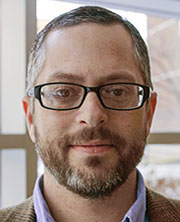Back in 2004 when Rein in Sarcoma awarded its first $10,000 research grant, it felt like a giant step along an uncharted path. Looking back, it now seems the initial $10,000 ‘seed’ has grown into a tall, broad, bright sunflower.

That first grant funded research overseen by Logan Spector, Ph.D., director of the Division of Epidemiology and Clinical Research at the University of Minnesota.
Spector recalled that he received the grant around the end of the first era of genetic exploration. He used the grant money to launch The Genetics of Osteosarcoma (GO) Study involving the collection of DNA samples at the University of Minnesota.
But Spector thought he could do more, so he took what he’d started with Rein in Sarcoma and applied for a multi-million dollar medical research grant from the National Institutes of Health (NIH). He got it.
The NIH money went toward one of the last candidate gene studies it ever funded. Why was it one of the last? Because technology had advanced into breakthrough areas that would allow researchers to do things like drop DNA onto a chip containing a million markers — to isolate the critical 1-4 markers that point to why a specific patient got sarcoma cancer.
Spector credits Rein in Sarcoma with being the spark that ignited the interest and funding that have led to nearly two decades of progress. Said Spector, “It was the Rein in Sarcoma funding that allowed us to prove we could get DNA samples from patients. That provided the base for all the next steps.”
Given that sarcoma cancer research faces enormous roadblocks, Spector’s and Rein in Sarcoma’s accomplishments are extraordinary.
Most medical research funding goes toward diseases that impact a greater percent of the population. Additionally, there are more than 70 types of sarcoma cancers. Each requires a different treatment depending on the sarcoma’s type, location and other factors.1
The American Cancer Society described sarcoma research challenges on its website, saying, “Because soft tissue sarcomas are rare and there are so many different types, it’s been hard to study it well.”2
While osteosarcoma is not a soft tissue sarcoma, it shares the characteristics of being rare, with many different types. It makes it hard to know where to begin!
In fact, the community of patients, families, medical providers and researchers that band together to raise money for sarcoma research are truly among the most influential forces in play. Rein in Sarcoma provides a gathering place, a way to share insights and information, and serves as a catalyst to combine each person’s efforts, build bridges, and ensure that research dollars are used as intended.
More and more entities are recognizing philanthropy-driven medical research as a powerful influence that helps researchers find answers that may prevent and treat lesser known diseases.
A 2018 Philanthropy Journal article by Becky Chapman Weaver, chief mission officer for a nonprofit, sums it up well:
“Medical philanthropy can play an outsized role in catalyzing and jumpstarting innovation. Without donors and volunteers, some of today’s life-saving treatments simply would not exist.”3
Chapman Weaver goes on to say, “Look behind almost every medical breakthrough, and you’ll see many years of smaller discoveries, each building upon the last. These steps are often unseen, much like our donors and volunteers, but they are crucial to research.”3
Regarding Rein in Sarcoma’s leadership in fundraising and distributing research grants, the impact goes well beyond the lab. Spector says that the mission has attracted students to the field. Some want to continue the research. Others want to serve as medical practitioners. What unites the patients, families, researchers and practitioners is that they all want to make a difference. And they do.
Sources:
1 Mayo Clinic Staff. Sarcoma. mayoclinic.org. Accessed August 21, 2021. https://www.mayoclinic.org/diseases-conditions/sarcoma/symptoms-causes/syc-20351048
2 The American Cancer Society medical and editorial content team. What’s New in Soft Tissue Sarcoma Research? Last revised April 6, 2018. Accessed August 21, 2021. https://www.cancer.org/cancer/soft-tissue-sarcoma/about/new-research.html#:~:text=Because%20soft%20tissue%20sarcomas%20are,for%20ways%20to%20improve%20treatments.
3 Chapman Weaver, Becky. A Nonprofit’s Role in Medical Research. Published January 2, 2018. Accessed August 21, 2021. https://pj.news.chass.ncsu.edu/2018/01/02/a-nonprofits-role-in-medical-research/


